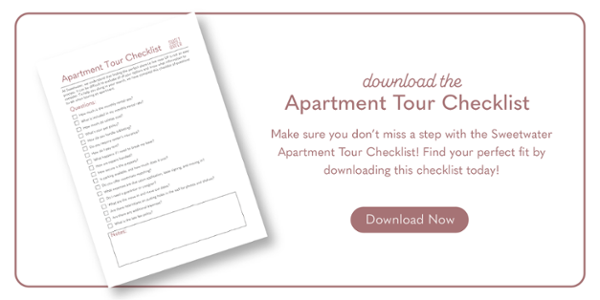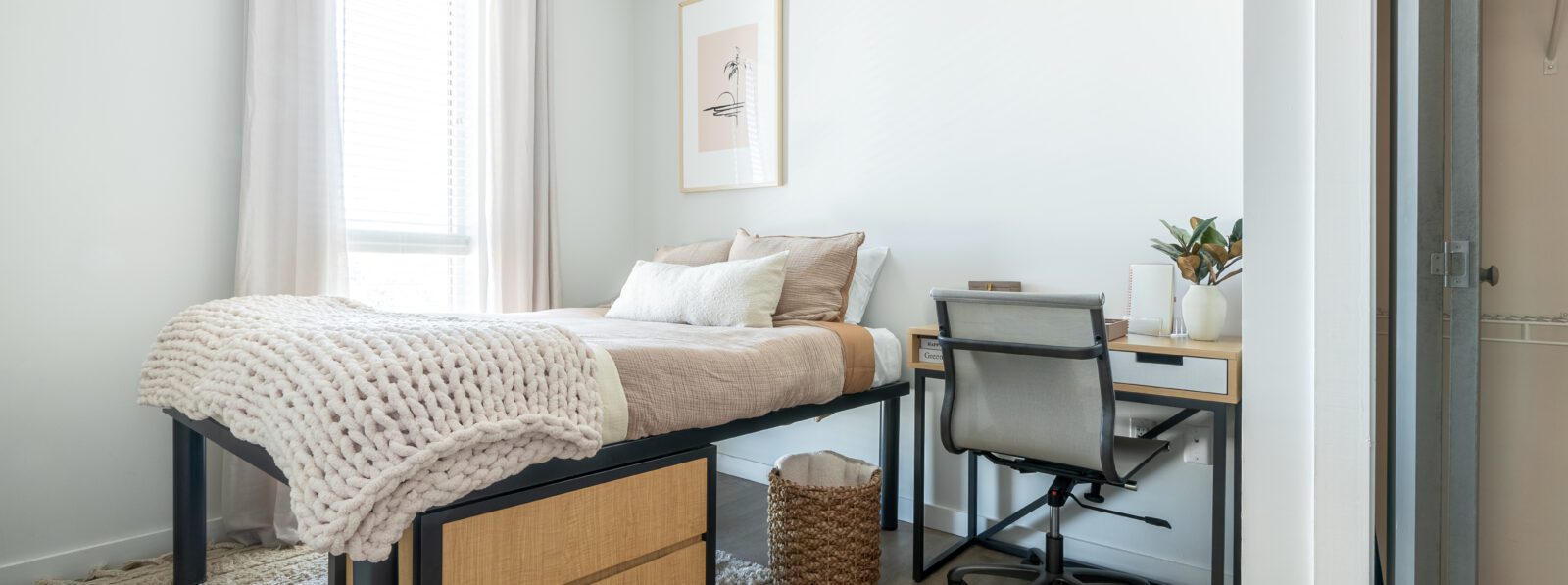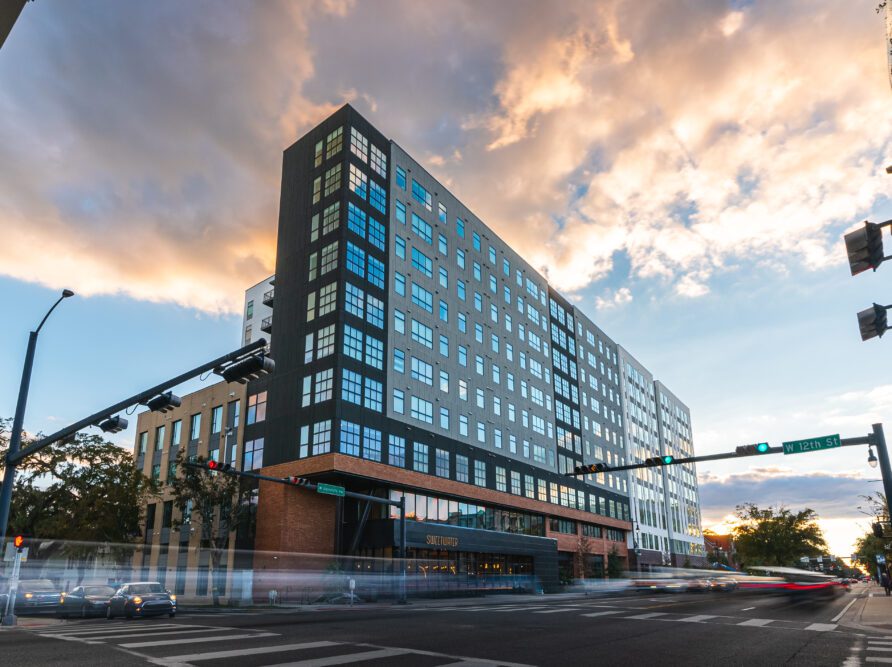Are you a student at UF looking for housing in Gainesville? At Sweetwater, we’ve helped hundreds of students on their journeys to finding student housing, and we know how stressful the process can be.
Read Next: 5 Benefits of Signing an Individual Lease at an Apartment at UF
That’s why we’ve created this list of 15 questions you should ask when touring a student housing apartment so you can know all of the important information about a complex before signing a lease.
What to Ask Before Signing a Lease at a New Student Housing Development
-

Students who live at student housing apartments love to explore new areas in Gainesville.
1. What are the specific lease terms?
Leases can be long and complex, but it’s extremely important that you understand what you’re agreeing to before signing. Most importantly, you should be very clear about the length of your lease (9 months vs. 12 months) and when you can move in.
Other things that are usually included in a lease that you should ask about are:
- Restrictions on putting holes in the walls (hanging pictures or installing shelves)
- Subleasing policy
- Pet policy
- Late fee policy
- Additional expenses
2. What is included in my monthly rental rate?
It is important to know what your apartment complex includes in your monthly rental rate.
- Utilities: At most student housing apartments, utilities are a separate cost, but at some complexes, it is included in the rental rate.
- Water: Water is usually included in the rental rate, but sometimes, apartments make this a separate cost.
- WiFi: Most apartments near campus have free WiFi for residents. This is usually a high priority for most tenants at student housing apartments at UF because many students take online classes. At traditional apartments, most tenants are responsible for setting up their own WiFi.
- Cable: Most student housing apartments at UF have cable included in their monthly rental rate.
- Trash: Many student housing apartments have trash service, but some complexes just have a trash shoot, so be sure to ask about the trash accommodations when touring an apartment.
- Parking: Most student housing apartments do not have parking included in the monthly rental rate, but they offer parking options at an additional cost.
Read Next: What’s Typically Included in Student Housing Rent in Gainesville?
3. How much do utilities cost?
While the cost of utilities can vary greatly based on the tenant, the leasing staff should be able to give you an estimate of the average cost of utilities for their residents. This will give you a better idea of how much you should a lot for utilities so you can better calculate your personal budget.
4. What is your pet policy?
This is especially important if you are considering bringing your family pet to school or if you want to foster. Most student housing apartments allow for certain animals and certain breeds at an additional cost. Typically, residents have to pay a one-time pet deposit and monthly payments.
5. How do you handle subletting?
Subletting policies are important for students who do not plan to live in their apartments for the entire length of the lease. Most student housing apartments allow for subletting, but make sure you fully understand the terms of the subletting policy if you plan on having someone sublease from you for a period of time.
The subletting policy should be specified in your lease terms, but it is always best to ask an apartment manager or landlord to clarify. Subletting without permission can lead to legal issues, so be sure that you’re following the terms of your lease.
6. Do you require renter’s insurance?
Renter’s insurance is important and should be considered during your apartment search. With renter’s insurance, your apartment is covered in the event of a fire, flood, theft, or other similar incidents. Some rental insurance plans at student housing apartments also cover injuries that take place in your apartment.
While renters insurance is always a good idea to have, some apartments require it. Also, some apartments offer their own rental insurance for a small additional fee. When you’re touring, make sure to ask whether or not the apartment requires renter’s insurance, as well as whether or not they offer their own plan.
7. How do I pay rent?
Most student housing options will have different options of ways you can pay rent each month. These can include going online each month to make a payment, using auto-pay, or an old-fashioned check.
For college students, auto-pay is the most common and the easiest to make sure you pay your rent on time each month. It will help you avoid late fees, and you won’t have to sign on to pay each month. Whether you choose to pay via auto-pay, paying online each month, or using a check, be certain you have a clear understanding of where your payment should go, who it’s addressed to, and when it needs to arrive.
8. What happens if I need to break my lease?
Breaking a lease is never ideal, but just in case you ever have to, you should read your apartment’s lease-breaking policy before signing a lease so you know what you’re agreeing to.
Most apartments require you to pay a fee in order to break your lease and find a replacement tenant, but some apartments allow you to break the lease without a fee and some don’t make you find a replacement tenant. Basically, what I’m saying is lease breaking policies vary greatly depending on the apartment complex, so make sure you are clear about what your complex’s policy is before signing the lease.
Additionally, if you plan on studying abroad or graduating early, signing a year-long lease might not be the best choice for you, so make sure you understand the penalties for terminating your lease early.
9. How are repairs handled?
Maintenance is an important topic to discuss while touring an apartment because oftentimes in college, accidents happen and you’ll need help fixing something. Whether your sink is clogged or you make a hole in the wall, the apartment’s maintenance team should have a system for requesting a maintenance appointment.
You should also ask about how emergency repairs are handled because some apartments have maintenance available 24/7, but others only have maintenance available between specific hours. However the process works, you will want to know ahead of time to ensure an efficient, speedy resolution to any maintenance issues.
10. How secure is the property?
Security and safety are often the most important factors for parents to consider when searching for an apartment. When touring, ask your tour guide to discuss the building’s security, both inside features and external security measures.
Security measures the complex may have include:
- A buzzer system
- 24/7 security
- Fob or phone entry
Also, if there’s a parking garage, figure out how you will enter the building from it to make sure it is safe and secure.
Within your apartment, your unit may have:
- Deadbolt locks on the front door
- Individual bedroom door locks
11. How often does rent typically increase, and by how much?
At apartments near the UF campus, it is common for properties to increase rent each year when renewing your lease. These increases aren’t always stated in the rental agreement, so make sure you ask how much you will be expected to pay so that you are prepared if you decide you want to resign for the same apartment again at the end of your lease term.
12. Is parking available, and how much does it cost?
Parking is tough in Gainesville, so living at an apartment complex that offers parking is clutch. Most of the student housing apartments near campus offer parking at an additional cost, typically ranging from $100 to $200 per month.
Aside from the apartment-offered parking, most apartments near campus are located in a city parking zone, so you can buy a parking decal through the City of Gainesville website.
13. Do you have roommate matching?
If you haven’t found a roommate yet, many student housing apartments have a roommate matching program to find you a roommate who they think you will be compatible to live with. Usually, this is done by having you fill out a quick survey and then pairing you with your ideal roommate match. If this is something you’re interested in, be sure to ask if the apartment offers roommate matching when you tour.
14. What expenses are due upon application, lease signing and move-in?
Aside from your monthly rental rate, most apartment complexes near campus require an application fee, an admin fee, and a security deposit upon move-in or lease signing.
- Application Fee: The application fee is usually a non-refundable charge that covers the cost of the background checks used in approving your application, including a screening of your guarantor that’s necessary in approving their guarantor status.
- Admin Fee: The admin fee is usually a non-refundable service charge for administration, billing, bill auditing, overhead and similar expenses that will be incurred by the apartment complex throughout your lease. This is typically paid when you sign your lease.
- Security Deposit: The security deposit is usually a refundable charge that will be repaid to you at the end of your lease term as long as there is no damage to the apartment beyond typical wear. Your security deposit is typically due when you move-in, but that differs based on apartment complex.
15. Do I need a guarantor or co-signer?
Most likely, the answer is “yes.” If you’re a full-time student who does not work, or only works part-time, you’ll probably need a guarantor.
A guarantor is someone who co-signs the lease and is responsible for any rent payments that you cannot or do not make. Most housing options in Gainesville do not accept tenants who are undergraduate students unless they have a guarantor, so make sure you ask whether you need a guarantor and how the co-signing process works before signing.
Touring an apartment is an excellent step in your search to find the right student housing for you. It’s important to ask questions when touring to ensure that you understand the process and will be getting everything you want out of your future home. Download our apartment tour checklist before you go to help evaluate your options and get the most out of your tour.

For more information on student housing apartments near campus, contact the Sweetwater leasing team who are happy to answer any questions you may have about leasing an apartment.If you’d like to learn more about Sweetwater, visit our amenities and floor plan pages for more information.



